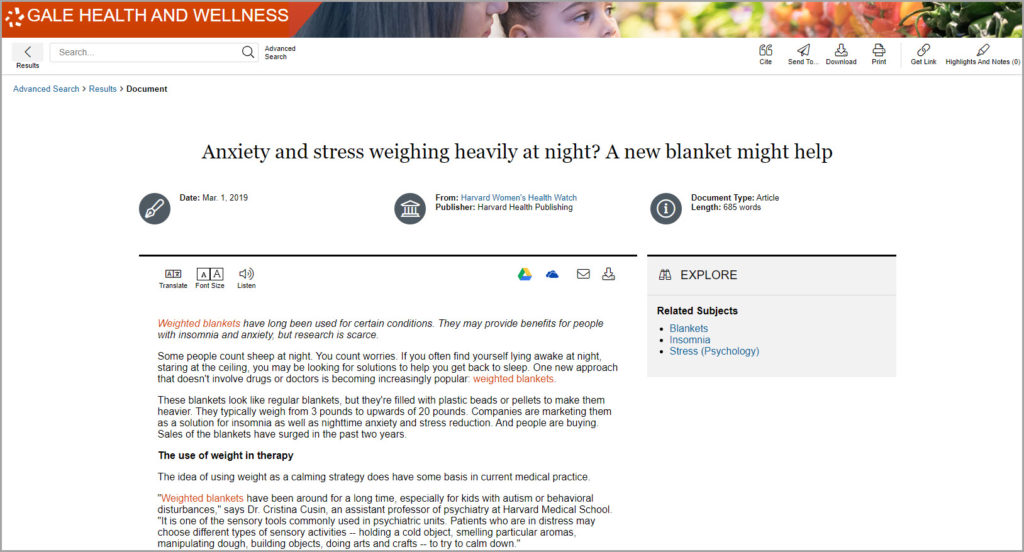| By Kimberly Hayes |
College is full of exciting experiences and opportunities, but it can also be overwhelmingly stressful. More than one in three first-year college students around the world struggle with a mental health disorder, and new studies are finding that lack of sleep (a common occurrence in college) only makes the problem worse.1 Why? Lack of sleep directly impacts the part of the brain responsible for emotion management. According to Talkspace, “Due to their fatigue, people struggle to regulate their emotions, and further negative feelings often come up as a result, leading the cycle to continue.”2 A good night’s rest might sound hard to come by as a college student, but the following are ways, found inside Gale Health and Wellness, to help you break that vicious cycle.

Upgrade the Dorm Mattress
Ask any college student and they’ll tell you the mattress that comes standard in a dorm room or apartment isn’t anything to write home about. It’s not comfy, so how can you expect to rest when it feels like you’re sleeping on a piece of concrete? Memory foam mattresses can be a good solution since they not only provide comfort, but they’re suitable for most body types and sleep positions. They come in a range of prices and styles, from flippable to hybrid, making it easier to find something that meets your budget and preferences. If you’re not ready to splurge on a new mattress, consider a mattress topper. They have similar effects, and you’ll likely find they’re more budget friendly as well.
Make Your Bed a Comfy Sanctuary
Your room should be a cozy haven, which is why studying and doing homework from bed isn’t a good idea. Not only does it impact your focus and productivity by making breaks and naps a temptation, but it can trick your mind into thinking the bed is a place to think and work. This isn’t bad when you’re cranking out a paper, but it’s not good when you’re trying to fall asleep. Leave the work to your desk and instead focus on making your bed a sleep sanctuary. Perhaps you should consider a weighted blanket to calm your sensory nervous system, lower stress and anxiety, and make it easier to fall into a deep sleep. Or maybe you could use a new pillow or two or three (depending on your preference), because let’s face it, those standard pillows are as uncomfortable as the mattress.

Incorporate Some Accessories
It never fails that the light comes streaming right into your window, and no matter how hard you try and how tightly you squeeze your eyes shut, you can’t seem to convince your body and mind that you need more sleep. Blackout curtains block unwanted light and can even reduce noise, making uninterrupted sleep possible. If you’re not willing to give up your ombre curtains that perfectly match your bedding, consider getting an affordable sleep mask. You can also really amp up the nighttime cozies with a sound app that plays music tailored for sleep. Lastly, an oil diffuser or even a lotion or pillow mist infused with essential oils known for their sleep-inducing effects (e.g., lavender, valerian, cedarwood) can work wonders as well.
Adjust the Temperature to Your Liking
Some of us sleep hot while others sleep cold, and there’s nothing worse than tossing and turning because you’re sweating or freezing. If you live in a dorm, you likely don’t have the luxury of controlling the A/C unit, but you can take matters into your own hands with a clip-on bed fan, cooling sheets, or a heated blanket. Avoid space heaters though, as they not only pose a fire risk, but your RA will probably tell you they’re not allowed.
College life can be stressful, making it harder to turn your brain off at night to sleep. This creates a problem for students who are dealing with mental health concerns, creating a cycle that feeds off of one another. Sleep isn’t a cure-all, but a good night’s rest is a step in the right direction for your mental health.
- “1 in 3 College Freshmen Faces Mental Health Woes,” Consumer Health News, Gale Health and Wellness Online Collection, September 13, 2018; Weidman Burke, Chelsea. “Sleep,” Gale Health and Wellness Online Collection, 2019.
- Havis, Richard James. “The Surprising New Connection between Sleep and Mental Health,” Talkspace, January 18, 2018.
For More Resources:
“Suicide Is the Second Leading Cause of Death among College Students,” Active Minds.“
Best Memory Foam Mattress Reviews,” Slumber Yard.
“The 10 Best Mattress Toppers of 2019,” The Spruce.
“Never Do Homework in Bed: 3 Reasons Why,” American College of Healthcare Sciences.
“5 Benefits of a Weighted Blanket, According to Experts,” Good Housekeeping.
“The Best Pillows for Every Type of Sleeper,” GQ.
“Blackout vs. Soundproofing Curtains,” Residential Acoustics.
“Best Sleep Apps for 2019,” ResMed.
“The Best Essential Oils for Sleep,” Forbes.
Meet the Author
Kimberly Hayes enjoys writing about health and wellness and created Public Health Alert to help keep the public informed about the latest developments in popular health issues and concerns.


